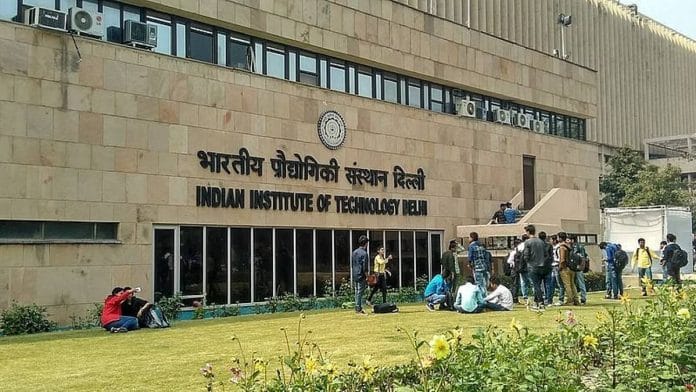New Delhi: Organising pizza parties to increase student attendance in mental health awareness workshops, using artificial intelligence and machine learning apps to provide customised mental health aid and counseling, and conducting a complete psychometric assessment profile of students when they enter the institution — these are some of the measures that top technical institutions in the country have started using to address mental health issues of their students in campus, ThePrint has learnt.
In a day-long workshop held at Indian Institute of Technology Delhi, Tuesday, directors and deans from notable public and private technical colleges in the country, including the Indian Institutes of Technology (IITs), Indian Institute of Science (IISc), Indian Institute of Science Education and Research (IISER) and Birla Institute of Technology and Science (BITS), discussed the best practices that they follow, challenges faced, and the way ahead to improve mental health grievance redressal mechanisms on campus. ThePrint was present at the workshop.
The institutions have been tasked by the Ministry of Education to come up with ways to “empower students” to get better mental health support on campus and share a proposal on the same.
“Students who have come through the grind of four-five years of preparation may not have the psychological tools to handle difficult situations. And we are sending them out to a world which is not easy to navigate. We are expecting some outcome from this workshop wherein we can take inputs and circulate them across institutions for an accountable and standardised system for student grievance redressal,” said Saumya Gupta, joint secretary, Department of Higher Education, who was present at Tuesday’s workshop.
Gupta also urged institutions to devise more humane approaches to deal with students’s issues.
In March, the education ministry had told the Parliament that as many as 33 students had died by suicide since 2018 across the IITs. In this very year, four students have allegedly died by suicide at IIT Madras.
In February this year, 18-year-old Darshan Solanki, allegedly died by suicide in IIT Bombay by jumping off the seventh floor of a campus building. Darshan’s family, who are from a backward community, alleged he was ostracised because of caste.
According to the ministry’s response in Parliament, IITs see the highest number of student suicides among science and technology institutions in the country, followed by the National Institutes of Technology (NITs) — which reported 24 such deaths since 2018 — and the Indian Institutes of Management (IIMS) with four.
On 21 March, Education Minister Dharmendra Pradhan had chaired a high-level meeting to discuss the emotional and physical wellbeing of students and directed officials to create a framework to help students.
Also read: What if? 5 student ‘suicides’ in 2 weeks raise big mental health question for Tamil Nadu schools
Challenges and way ahead
At Tuesday’s workshop, several institutions spoke about the challenges facing them while dealing with mental health issues and privacy-related concerns among students. According to the institutions, the major pressure or stress points for students remained – pressure of academic performance, interpersonal relations with family and peers and their past life events and trauma.
The institutes also discussed the AI-based mental help apps and websites they have introduced to aid students with customised counseling. However, professors agreed that Western apps are still not effective for culturally different Indian students.
Discussions were also held on ways in which students who do not seek help can be brought into the mental health wellness programmes. The ethical dilemma of admitting unwilling students in hospitals and privacy concerns over seeking full psychometric assessment of students at the time of admission were also looked at.
“The IISc is working on coming up with a document which will help institutions in cases of students who need mental health aid and hospitalisation and are refusing it. Since admission into the medical system requires legal consent from the patient, the institution will provide financial aid and support to encourage more students to come forward,” Anil Kumar, dean (administrations) at IISc Bengaluru, said.
Institutions also spoke about some unique challenges faced by them.
For instance, IIT Mandi director Laxmidhar Bahera spoke about how access to drugs was an issue for the Himachal Pradesh-based campus.
“Our campus is located 15 kilometers away from the nearest habitation and still has a porous boundary. I sometimes get calls in the middle of the night that some student has gone missing. We have found students in obscure trails at odd hours. Last year we caught 10 first-year students with marijuana in their possession,” he said.
Several deans also advocated the need for adding yoga and meditation into the mainstream student wellness programme.
Professor Tanusree Chakraborty of IIT Delhi, who is helping students meditate on campus said, “I have held several meditation sessions wherein students with anxiety and suicidal thoughts have come forward and spoken about their issues.”
Highlighting the need for making yoga and meditation a regular practice among students, she added, “The way our age-old traditions are being effectively used in the West to help students, needs to be brought back to our campuses as well.”
Institutes also brought up the issue of infrastructure.
“In our institute, the counselor, deans and wardens are there 24×7 for the students. Despite this, it’s not enough. We need to take support of senior students, look at mechanisms, understand causes of problems and the kind of anxieties people face,” said IIT Delhi director Rangan Bannerjee.
He added: “We all have a very diverse group of students… with the kind of pressures and expectations in today’s society, we need to provide an inclusive environment and support.”
(Edited by Poulomi Banerjee)
Also read: What explains the ‘33 student suicides at IITS since 2018’ — academic stress, mental health issues?






